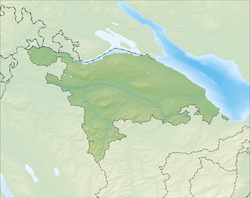Berg, Thurgau
| Berg | ||
|---|---|---|
 |
||
|
||
| Coordinates: 47°34′N 9°10′E / 47.567°N 9.167°ECoordinates: 47°34′N 9°10′E / 47.567°N 9.167°E | ||
| Country | Switzerland | |
| Canton | Thurgau | |
| District | Weinfelden | |
| Area | ||
| • Total | 13.09 km2 (5.05 sq mi) | |
| Elevation | 540 m (1,770 ft) | |
| Population (Dec 2015) | ||
| • Total | 3,301 | |
| • Density | 250/km2 (650/sq mi) | |
| Postal code | 8572 | |
| SFOS number | 4891 | |
| Surrounded by | Birwinken, Bürglen, Kemmental, Lengwil, Weinfelden | |
| Website |
www SFSO statistics |
|
Berg is a municipality in the district of Weinfelden in the canton of Thurgau in Switzerland.
The earliest traces of human settlement come from the Stone Age and there are scattered Bronze Age items around Berg. The modern village of Berg is first mentioned in 796 as Berga. In the Early Middle Ages, Berg and the surrounding land were in the possession of the Bishop of Constance and were on the southern border of the Bishop's land. A fortress was first built in the 12th-13th Century, which was replaced in 1600 by a castle. The castle and the rights to rule over the villages of Berg, Andhausen, Donzhausen and parts of Andwil (TG), Mauren and Mattwil were rented out by the Cathedral of Constance (not the Bishop) until 1798. The circumstances behind the removal of the diocese's administration and the emergence of the court in 1386 are unclear. Some of the owners of the village included Egli von Zug (1518–67), Brümsi von Herblingen (1586-1653/56) and the von Thurn-Valsassina family (1676–1798).
The village chapel was probably built in the 11th Century. In 1506 a benefice was donated, so that a chaplain could be supported in the village. The chapel remained a filial church of Sulgen. During the Protestant Reformation in 1529, the village converted to the new religion, while the court and ruler remained Catholic. Due to the religious tension, regular church services were not held in Berg until 1575. Until the founding of the Reformed parish in 1851, Berg was part of the parish of Sulgen. In 16th and 17th Centuries, the Catholic parish also included Altishausen, Birwinken, Dotnacht, Graltshausen, Guntershausen, Hugelshofen and Mattwil. In 1935, the church stopped being a shared church and a Catholic church was built.
...
Wikipedia




